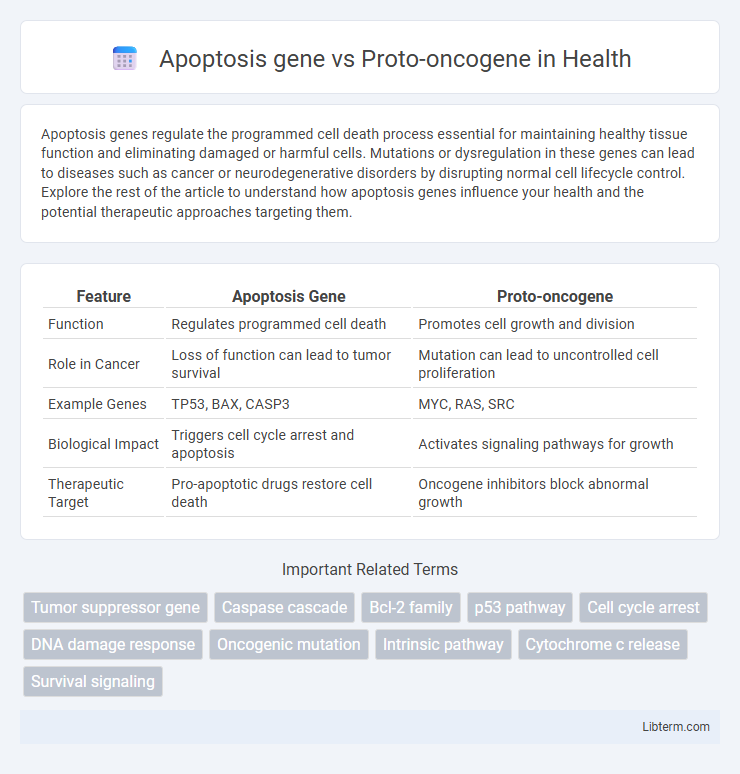Apoptosis genes regulate the programmed cell death process essential for maintaining healthy tissue function and eliminating damaged or harmful cells. Mutations or dysregulation in these genes can lead to diseases such as cancer or neurodegenerative disorders by disrupting normal cell lifecycle control. Explore the rest of the article to understand how apoptosis genes influence your health and the potential therapeutic approaches targeting them.
Table of Comparison
| Feature | Apoptosis Gene | Proto-oncogene |
|---|---|---|
| Function | Regulates programmed cell death | Promotes cell growth and division |
| Role in Cancer | Loss of function can lead to tumor survival | Mutation can lead to uncontrolled cell proliferation |
| Example Genes | TP53, BAX, CASP3 | MYC, RAS, SRC |
| Biological Impact | Triggers cell cycle arrest and apoptosis | Activates signaling pathways for growth |
| Therapeutic Target | Pro-apoptotic drugs restore cell death | Oncogene inhibitors block abnormal growth |
Introduction to Apoptosis Genes and Proto-oncogenes
Apoptosis genes regulate programmed cell death, crucial for maintaining cellular homeostasis and preventing tumor development by eliminating damaged cells. Proto-oncogenes encode proteins that promote cell growth and division, requiring tight regulation to avoid uncontrolled proliferation leading to cancer. Dysregulation of apoptosis genes or activation of proto-oncogenes significantly impacts cancer pathogenesis and therapeutic targeting.
Defining Apoptosis Genes: Roles and Mechanisms
Apoptosis genes encode proteins that regulate programmed cell death, crucial for maintaining tissue homeostasis and preventing tumor formation by eliminating damaged or potentially cancerous cells. These genes, such as BCL-2 family members and caspases, orchestrate intrinsic and extrinsic apoptotic pathways through mechanisms like mitochondrial membrane permeabilization and activation of proteolytic cascades. In contrast, proto-oncogenes primarily promote cell growth and division, and their dysregulation can inhibit apoptosis, contributing to oncogenesis.
Understanding Proto-oncogenes and Their Functions
Proto-oncogenes are essential genes that regulate normal cell growth and division by encoding proteins such as growth factors, protein kinases, and transcription factors. These genes become oncogenes when mutated or overexpressed, leading to uncontrolled cellular proliferation and tumor formation. Understanding proto-oncogenes allows for targeted cancer therapies by interrupting abnormal signaling pathways that drive malignancy.
Molecular Pathways: Apoptosis vs. Cell Proliferation
Apoptosis genes regulate programmed cell death through intrinsic and extrinsic molecular pathways, involving key proteins such as Bcl-2 family members, caspases, and p53 to maintain cellular homeostasis. Proto-oncogenes encode proteins that promote cell proliferation by activating signaling cascades like the Ras-MAPK and PI3K-Akt pathways, which drive cell cycle progression and growth factor responses. Dysregulation of apoptosis genes leads to impaired cell death, while mutations in proto-oncogenes result in unchecked cell division, both contributing to tumorigenesis through disrupted balance between cell survival and proliferation.
Apoptosis Gene Mutations and Disease Implications
Mutations in apoptosis genes, such as TP53 and BAX, can lead to impaired programmed cell death, contributing to uncontrolled cell proliferation and cancer development. Unlike proto-oncogenes, which when mutated become oncogenes promoting tumorigenesis, apoptosis gene mutations result in the failure to eliminate damaged or abnormal cells, increasing the risk of diseases like lymphoma, leukemia, and solid tumors. Identifying specific apoptosis gene mutations is critical for targeted therapies and improving prognostic outcomes in cancer treatment.
Proto-oncogene Activation and Cancer Development
Proto-oncogene activation occurs through mutations, gene amplification, or chromosomal translocations, leading to uncontrolled cell proliferation and cancer development. These genetic alterations convert proto-oncogenes into oncogenes, driving oncogenic signaling pathways that override normal apoptosis mechanisms. Dysregulated proto-oncogene expression contributes to tumor progression by promoting cellular survival, growth, and resistance to apoptosis, highlighting its pivotal role in oncogenesis.
Key Differences Between Apoptosis Genes and Proto-oncogenes
Apoptosis genes regulate programmed cell death to maintain cellular homeostasis by eliminating damaged or unneeded cells, often functioning as tumor suppressors. Proto-oncogenes encode proteins that promote cell growth and division, which can transform into oncogenes upon mutation, leading to uncontrolled proliferation. The key difference lies in their opposing roles: apoptosis genes inhibit tumor formation by inducing cell death, whereas proto-oncogenes facilitate normal cell growth but may contribute to cancer when mutated.
Interactions and Crosstalk: Regulatory Networks
Apoptosis genes and proto-oncogenes engage in complex regulatory networks where their interactions modulate cell fate decisions, balancing proliferation and programmed cell death. Crosstalk between these gene classes occurs via signaling pathways such as the p53, Bcl-2, and MAPK cascades, integrating stress responses and growth signals to maintain tissue homeostasis. Dysregulation in this interplay often leads to oncogenesis by disrupting apoptosis and promoting unchecked cellular proliferation.
Therapeutic Targeting: Opportunities and Challenges
Apoptosis genes regulate programmed cell death, making them crucial therapeutic targets for cancer treatment by promoting tumor cell elimination. Proto-oncogenes, when mutated, drive unchecked cell proliferation, presenting challenges in selectively inhibiting oncogenic signaling without impairing normal cellular functions. Targeting apoptosis pathways offers opportunities to restore cell death in resistant tumors, while proto-oncogene targeting requires precision medicine strategies to minimize off-target effects and overcome tumor heterogeneity.
Future Directions in Cancer Research and Gene Therapy
Research in cancer therapy is increasingly targeting apoptosis genes and proto-oncogenes to develop precision treatments that selectively induce cancer cell death or inhibit uncontrolled cell proliferation. Emerging gene therapy approaches focus on restoring apoptotic pathways via tumor suppressor gene activation and silencing proto-oncogenes using CRISPR-Cas9 or RNA interference techniques. Future directions emphasize combining apoptosis gene modulation with proto-oncogene suppression to enhance therapeutic efficacy and overcome resistance in various cancer types.
Apoptosis gene Infographic

 libterm.com
libterm.com